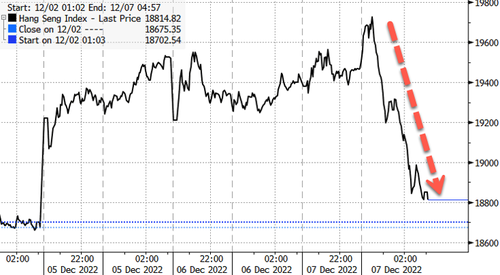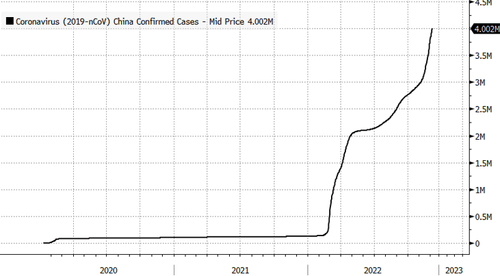China relaxed its zero Covid strategies to prevent further public unrest and boost waning economic growth. The new measures allowing for home quarantines and entry into public areas without testing were announced after a meeting of the Chinese Communist party's politburo. They outlined the importance of stabilizing the economy than combating Covid.
"We will protect people's safety and health to the greatest [extent] and keep the impact on social and economic development to a minimum," the State Council Prevention and Control Mechanism said on Wednesday, which was quoted by South China Morning Post.
The new measures from the communist government call for isolating asymptomatic or mild Covid cases at home rather than in quarantine camps or hospitals for seven days. Anyone in contact with the infected would have to quarantine at home for five days instead of eight days at a camp and then at home.
The State Council disbanded the rule for people to show negative Covid tests before entering public places.
"People no longer need to show a negative PCR [polymerase chain reaction] result or a health code to enter public venues or to travel, except when entering hospitals, schools and homes for the elderly," SCMP wrote.
SCMP added: "The new policy stressed that basic social and medical services need to be provided. People's movements, work and production should not be restricted in low-risk areas."
Today's announcement is the most significant move to ease Covid policies since the Council announced a 20-point playbook for relaxing measures last month.
Liang Wannian, an epidemiologist, now a health official who once led China's initial pandemic response, told Bloomberg that Beijing is more "proactive, rather than reactive" and would "ensure resources are utilized more efficiently and better coordinate outbreak control and economic development."
In Hong Kong, the benchmark Hang Seng initially surged on the news, then sold through most of the session, closing down 3%. There was also trade data for November that showed Chinese exports were hit by weak global demand and Covid disruptions at factories.
"Although the measures announced today are positive steps towards reopening, it appears some of the reopening exuberance is fading. Disappointing trade data is also a reminder of the slowing external demand heading into next year," said Marvin Chen, an analyst at Bloomberg Intelligence.
"Though the market is still trading on the positive expectations we are not entirely out of the woods, as we still have to get past the panic that might come with the first wave of infections," Ma Xuzhen, fund manager at Longquan Investment Management, said.
China's Covid outbreak is worsening as infections soar:
One million Chinese people are at risk of dying from Covid-19 during the coming winter months if President Xi Jinping pursues his pivot to remove strict pandemic controls, new modeling shows. -- Financial Times
"The current propaganda messaging is that a reopening will be costless," said Rodney Jones, principal at Wigram.
"The risk is that they are underestimating just how much work — and cost — the rest of the world has done and borne to get to the point of living with Covid.
"China has done nothing to prepare for this step, and Xi appears to be doing so on impulse as a reaction to the protests, rather than as part of a careful policy programme," Jones said.
Deteriorating global economic growth will worsen into early 2023. China's shift from zero Covid policies is a move to boost domestic demand over the medium term to stabilize its faltering economy. The next few months could be turbulent as the reopening process could be met with a wave of infections and deaths.


No comments:
Post a Comment
Note: Only a member of this blog may post a comment.